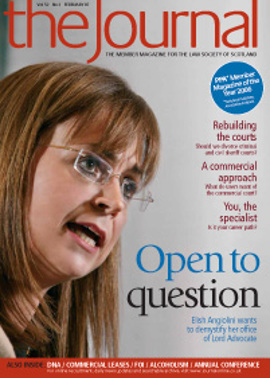Disabled from suing?

You will no doubt be aware of the government’s proposed regulations making it unlawful to discriminate against lesbian, gay or bisexual people in the provision of goods and services. Hotels and B&B establishments, for example, would no longer be able to refuse to accommodate two gay men booking a double room. But are you aware that the law has prohibited disability discrimination in the provision of goods and services for over 10 years?
Possibly you saw the recent media coverage of the court action against a hotel which failed to make reasonable adjustments to allow access to wheelchair user Isaac Curran. The action settled with the hotel paying out £3,000 to Mr Curran and £2,000 in legal expenses to the Disability Rights Commission which supported the case. The hotel also applied for planning permission to improve the disabled access. That case is just one example of the discrimination prohibited by Part 3 of the Disability Discrimination Act 1995 (“the DDA”). It is also a very rare example of a case taken to court in Scotland using these provisions.
Part 3 covers everyone who provides goods, facilities and services to the public, whether free or for payment. It includes local authorities, health services, restaurants, charities, banks, public utilities and you as solicitors. The Act outlaws treating a disabled person less favourably for a reason related to their disability. For example it was held unlawful for a pub to refuse to serve a customer with learning difficulties purely on the basis of prejudicial views of disability-related behaviour.
Service providers also have a positive duty to make reasonable adjustments in circumstances which make it impossible or unreasonably difficult for disabled people to use the service. Phone companies, for instance, have a duty to send bills in a different format, such as Braille.
The Act prohibits disability discrimination in insurance and housing as well. Part 4 has equivalent provisions in education.
It is estimated that there are around 1,000,000 disabled people in Scotland. Why then have there been only a handful of cases ever taken to court in Scotland under Part 3 or 4 of the DDA? The DDA’s employment provisions have been used in tribunal claims. In England there have been proportionately many more court cases under Parts 3 and 4. So what explains the dearth in Scotland?
I doubt anyone for a minute would think that this is because disabled people in Scotland have not experienced discrimination. If you walk down any high street, for example, you will see plenty of shops who have failed to make their premises accessible to wheelchair users.
Perhaps disabled people are unaware of their rights here. Potential litigants may want to pursue a complaint but are unaware that a legal remedy exists or that a solicitor could help.
Or maybe they are sufficiently aware that they may have a claim, but are put off contacting solicitors for other reasons. Are there barriers to disabled people instructing solicitors? Are solicitors and their services inaccessible? How many ensure that they discharge their own duties as service providers to make reasonable adjustments to enable potential and existing clients to access their services? Do you provide a hearing loop; correspondence in large print on request; premises accessible for those with mobility problems; accessible toilets? If you do, do you tell people you provide these?
Or perhaps potential litigants do get that far, but there are other barriers stopping cases getting to court. It may be that the court process is too daunting to potential litigants compared to the tribunal system. Could it be the hurdles faced by vulnerable individuals in litigation are too much, and more cases would get to court if class actions were possible?
Is there an unwillingness by solicitors to take on cases in an undoubtedly complex area of law? Is it part of a general reluctance to pursue social welfare law cases in Scotland (there are far fewer judicial reviews in Scotland in comparison to England)? Are there problems getting legal aid? Have the awards of compensation in the few cases in Scotland so far, been so low that potential claimants do not feel it is worthwhile?
The Disability Rights Commission has identified this lack of cases as an area of real concern. The law against disability discrimination is only going to work if service providers and education providers feel there is a real threat of sanction. Until more cases come to court, the law will not be seen to be working.
The Commission offers solicitors advice and support in pursuing cases under the DDA. In a limited number of cases financial assistance is also available to support individual claims which meet the Commission’s strategic priorities in areas which have been underused, like the provision of goods and services.
Please do contact us for advice or a discussion on possible funding. And any suggestions for what else can be done to improve the takeup of court cases under the DDA would be of great interest to us.
In this issue
- Routes to qualification: the Italian picture
- Speaking of change
- Disabled from suing?
- Hearing and answering
- Court afresh
- Clean sheet at the Commercial Court
- Making a specialism pay
- LCN DNA - devil in the detail
- To buy or not to buy?
- Just a winter warmer?
- Views from the new boy
- Working out time
- A claim in trust
- Incapable of dismissal?
- Chasing debts made simple?
- Scottish Solicitors' Discipline Tribunal
- Website reviews
- Book reviews
- FOISA goes to court
- On the wrong track?






